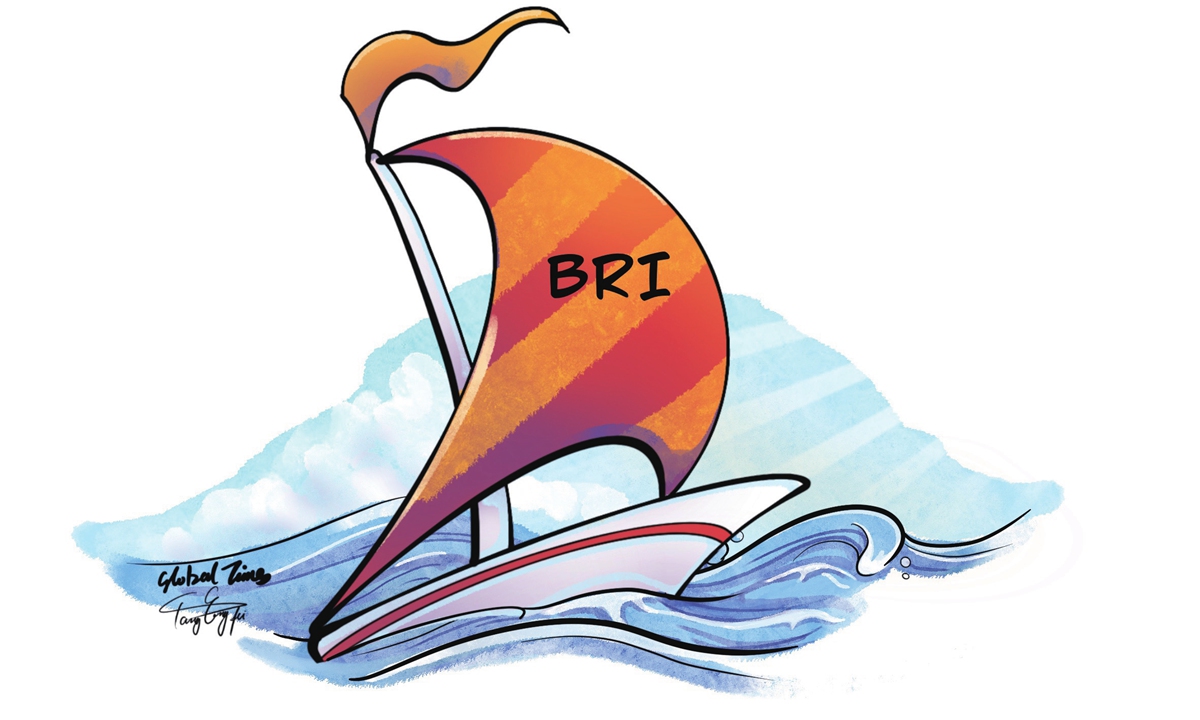
Illustration: Tang Tengfei/Global Times
Several Western media outlets have recently published articles suggesting the China-proposed Belt and Road Initiative (BRI) is in danger of losing momentum, meaning BRI loans to emerging economies are falling into repayment problems. The latest example is VOA's report claiming the debt burden of debtor countries has resulted in a new economic environment that forces China to slow foreign lending and improve credit risk management.
The report, citing analysts, said a "deflated" BRI will affect the reputation and prestige of China, and that it is precisely the opportunity for the US to increase its own influence and strengthen relationships with allies.
It is no surprise to see Western media outlets using a looming debt crisis to attack and discredit the BRI, but their efforts are futile and doomed to fail as their dishonest arguments are untenable. Three issues should be made aware of: First, global debt has indeed risen to dangerous levels, but US irresponsible monetary policy is a major blasting fuse and China should not be targeted as a scapegoat.
Global debt was already high in March when the US Federal Reserve tightened its monetary policy. The Fed's irresponsible policy added risks because it made the dollar stronger, and a strengthening dollar made it more expensive for developing countries to meet their dollar-denominated debt obligation. The Fed's tightening of its monetary policy is to blame, not the BRI.
Second, China is helping emerging economies develop, not accumulate debt. The world's second largest economy has never and will not engage in so-called "debt trap" diplomacy. The country, in contrast, has repeatedly expressed willingness to strengthen cooperation with other developing economies to jointly cope with common challenges.
For instance, China has been implementing the G20 Debt Service Suspension Initiative and is the biggest contributor to the effort. By contrast, Western commercial creditors and multilateral institutions, who hold the biggest share of debts, claimed they need to maintain their credit rating and have thus failed to make proportionate contributions to relieving the debt burden on developing countries, a Chinese Foreign Ministry spokesperson said in August.
US creditors should feel awkward to see the VOA report claiming a looming debt crisis is an opportunity for the US to increase its influence.
Third, it is normal to see China extend BRI cooperation with countries along the routes at its own pace regardless of Western media outlets' noise about so-called "deflated" development. At the very least, efforts to strengthen credit risk management doesn't mean the initiative has been deflated, and in fact the opposite appears to be true. Since the BRI was proposed, it has received positive responses from more and more countries and international organizations, and has become a popular international public product and cooperation platform.
As of the end of 2021, China has signed more than 200 cooperation documents on the joint construction of the BRI with 145 countries and 32 international organizations, covering investment, trade, finance, technology and other fields, according to a report released on Sunday by the National Bureau of Statistics.
For nine years since the launch of the BRI, much has been achieved in win-win cooperation between China and the international community. Western media outlets' efforts to discredit the BRI using a distorted and inaccurate "debt crisis theory" can never hinder the advancement of this initiative.
The author is a reporter with the Global Times. bizopinion@globaltimes.com.cn




